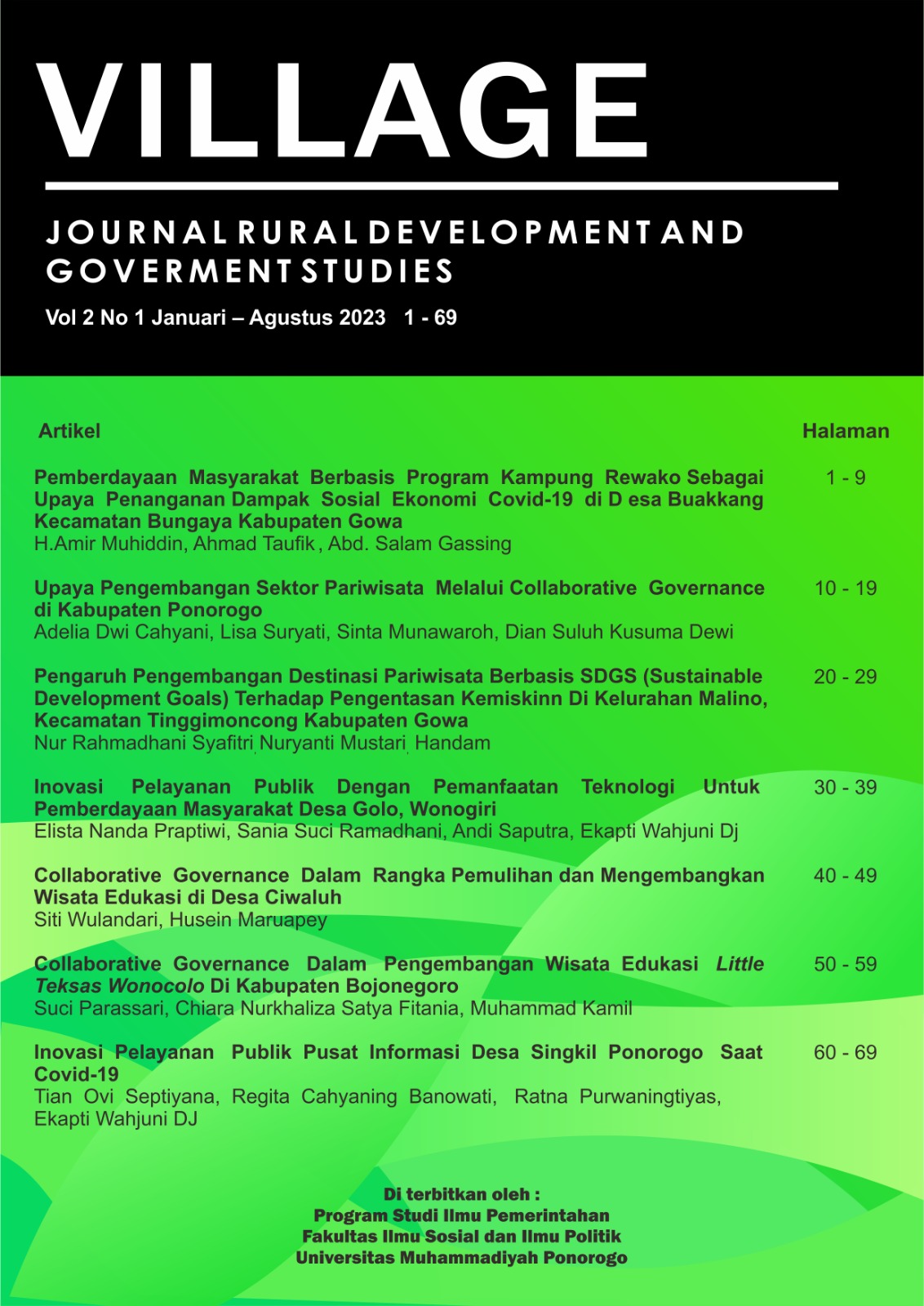Upaya Pengembangan Sektor Pariwisata Melalui Collaborative Governance di Kota Ponorogo
DOI:
https://doi.org/10.24269/vlg.v2i1.10101Abstract
This article aims to know the implementation of the principles of collaborative governance in the development of the tourism sector in the city of Ponorogo need a governance that can manage tourism in the current pandemic. This article was written using descriptive methods with qualitative approach Theory applied to achieve the objectives of this study is the theory which includes participation, acceptance, communication, trust and the principle of sharing. Tourism management needs special handling in the context of collaborative governance. Collaborativegovernance as a responsibility for the sustainability of tourism based on the incorporation of resources between the three pillars of governance. The implementation of collaborative governance practices aims to optimize the objectives of activities. Tourism development can remind economic growth in opening jobs, income and living standards in an area. In the management of tourism the role is not only done by one party but all supporting aspects involved in order to create experience and value of tourism benefits so as to provide benefits and benefits to the community to the environment. In this development does not involve only parties but starting from the community, the government as well as academics, private and stakeholders in the development area was implemented. The results of this study showed there are various forms of collaborative governance in the development of agrotourism tourism destinations Kedung Banteng.
References
Ansell, Chris and Alison Gash. (2007). “Collaborative Governance in Theoriand Practiceâ€, in Journal of Pablic Administrasi Research and Theory 18 : 543-571.
Dwiyanto, Agus (2012). Manajemen Pelayanan Publik: Peduli, Inklusi dan Kolaboratif, Yogyakarta: Gadjah Mada University Press.
Hermawati, R. S. (2021). Studi Alih Fungsi Lahan Eks Lokalisasi Kedung Banteng Menjadi Kawasan Agrowisata Di Kecamatan Sukorejo Kabupaten Ponorogo Dengan Pendekatan Collaborative Governance. JI@ P, 10(1).
Lynn, Jr, Laurence. E. (2006). Public Management : Old and New. New York : Routledge.
Musanef (1995) Manajemen Pariwisata di Indonesia. Jakarta, Gunung Harta.
Nugroho, I., & Hilman, Y. A. (2020). Sinergitas Program Fantastic! Ponorogo Dalam Rangka Pembangunan Pariwisata. Jurnal Ilmiah Wahana Bhakti Praja, 10(1), 220-229.
Nurhadi, Febrianti Dwi Cahya. "Strategi Pengembangan Pariwisata Oleh Pemerintah Daerah Terhadap Pendapatan Asli Daerah (PAD)(Studi Pada Dinas Pemuda, Olahraga, Kebudayaan Dan Pariwisata Kabupaten Mojokerto)." Jurnal Administrasi Publik 2.2 (2014): 325-331.
Pierre, Jon, and B. Guy Peters. (2000). Governance, Politicsandthe State. London: Mac Millan Press Ltd.
Primadany, S. R. (2013). Analisis strategi pengembangan pariwisata daerah (studi pada dinas kebudayaan dan pariwisata daerah kabupaten nganjuk). Jurnal Administrasi Publik, 1(4), 135-143.
Saint-Martin, D. (2000). Buildingthe New Managerialist State, Oxford University Press, Oxford.
Sentanu, I. G. E. P. S. (2020). Memperkuat Peran Pemerintah Daerah: Mengelola Pariwisata Lokal Yang Berkelanjutan. Jurnal Ilmu Administrasi Negara (JUAN), 8(1), 1-20.
Yoeti, Oka, A. (2008) Perencanaaan dan Pengembangan Pariwisata. Jakarta, Pradaya Pratama.
Zaenuri, M. (2018). Mengelola Pariwisata-Bencana: Perlunya Perubahan Paradigma Pengeloaan Pariwisata Dari Adaptive Governance Menuju Collaborative Governance. Unisia, 36(81), 157-168.
Downloads
Published
Issue
Section
License
Penulis yang mempublikasikan naskahnya pada Jurnal ini menyetujui ketentuan berikut:
Hak cipta pada setiap artikel adalah milik jurnal.
- Penulis mengakui bahwa VILLAGE : Journal Rural Development And Goverment Studies berhak sebagai mempublikasikan pertama kali dengan bekerja secara bersamaan dibawah Creative Commons Attribution License yang memungkinkan orang lain untuk membagi pekerjaan dengan pengakuan dari pengarang dan publikasi pertama dalam VILLAGE : Journal Rural Development And Goverment Studies;
- Penulis dapat memasukan tulisan secara terpisah, mengatur distribusi non-ekskulif  dari naskah yang telah terbit di jurnal ini kedalam versi yang lain (misal: dikirim ke respository institusi penulis, publikasi kedalam buku, dll), dengan mengakui bahwa naskah telah terbit pertamakali pada VILLAGE : Journal Rural Development And Goverment Studies;
- Penulis diperbolehkan dan didorong untuk mengirimkan pekerjaan mereka secara daring (misal melalui respositories atau website instansi penulis) sebelum atau selama proses pengiriman pada VILLAGE : Journal Rural Development And Goverment Studies berlangsung, ini dapat menjadikan pertukaran informasi yang sangat produktif, dan serta menjadikan kutipan yang banyak dari publikasi;
- Setiap naskah yang diterima wajib menyertakan Perjanjian Pemindahan Hakcipta (Copyright Transfer Agreement/CTA), sebelum artikel diterbitkan. CTA dapat diunduh di sini

